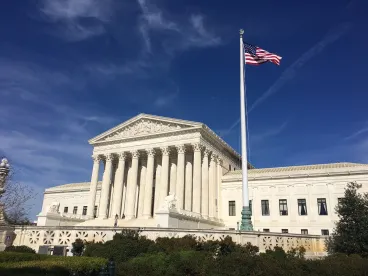For eight years, travel website Booking.com and the US Patent and Trademark office have been embroiled in a dispute over trademarking the company’s name. The US Supreme Court settled the controversy—and opened the door for other companies to trademark formerly generic names—with its June 30 decision in favor of Booking.com.
The Supreme Court ruled 8-1 in US Patent & Trademark Office v. Booking.com B.V., that Booking.com was a name eligible for trademark protection. The USPTO argued that the term was overly generic and that by granting trademark protection to one particular company, other travel businesses, who need to use “booking” in their name, would be squeezed out of the marketplace. The USPTO’s argument stemmed from an 1880’s case establishing that a generic term cannot be trademarked simply by adding “Company” or “Inc.” to the term. But the Justices—following the Court’s first-ever remote oral argument—dismissed those arguments and ruled that Booking.com was a distinct, company-specific term that met the standard for trademark protection.
In writing for the majority in Booking.com, Justice Ruth Bader Ginsburg says that customer perception makes all the difference. If customers perceive a term to apply to a particular company, rather than an entire category of products or services, then the term can receive trademark consideration.
“[W]hether “Booking.com” is generic turns on whether that term, taken as a whole, signifies to consumers the class of online hotel-reservation services. Thus, if “Booking.com” were generic, we might expect consumers to understand Travelocity—another such service—to be a “Booking.com.”… Consumers do not in fact perceive the term “Booking.com” that way…That should resolve this case: Because “Booking.com” is not a generic name to consumers, it is not generic.”
Justice Ginsburg also rejected the USPTO’s assertion that granting Booking.com a trademark would unfairly punish competitors. She noted that other companies still will be able to use the word “booking” to promote their businesses. Booking.com itself conceded that “Booking.com” would be a weak trademark and that even close variations of the mark would be hard to prosecute.
Going forward, trademark owners can be assured that the Trademark Office cannot apply a per se rule that a generic term combined with a generic Internet-domain name suffix will automatically be considered generic. The Supreme Court’s ruling means the USPTO will need to consider such requests on a case-by-case basis to determine if the mark, when viewed as a whole, is or is not generic based upon consumer perception.
This ruling is music to many people’s ears as marketing teams try and gobble up generic domains and then use them as trademarks. However, as the Supreme Court struck down a per se rule rejecting these marks as generic, there is also no per se rule that these marks will be found protectable. Trademark owners have a good argument that the domain name inherently points to one particular website and therefore distinguishes one particular source. However, the key to registration lies in the heads of consumers; if consumers believe the mark is the name of a class, then your mark is generic; if consumers see the mark as being able to distinguish among members of the class, you have a registrable trademark.




 />i
/>i

